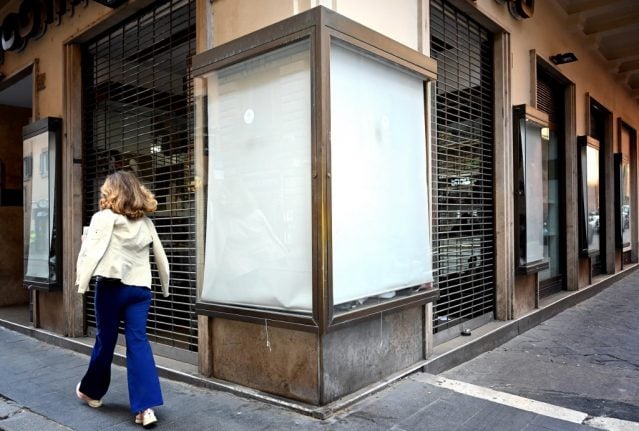The gangs: The Södertälje Network and the X-Team, an off-shoot of Bandidos.
The leaders: Bernard Khouri, 32, and Dany Moussa, 34.
Khouri – the kingpin, nicknamed The Godfather by some Swedish media, was born in Lebanon in 1980, lost his father in the civil war, and moved to Sweden with his mother and maternal grandparents when he was five years old. He came into contact with social services repeatedly during his upbringing, left school without grades, and was diagnosed in 2005 with anti-social personality disorder, and classified as a psychopath.
The prosecution said: The "Södertälje Network" organized primarily young men of Assyrian origin (from Iraq, Lebanon, and Syria) in planned crime.
The defence said: There was no "Network", just a group of friends whose "culture included criminal elements".
A gang or just friends?: Did not identify any gang emblem, but said police wire-taps and bugs revealed leaders issuing orders to associates to carry out crime. The name of Bernard Khouri – or his nicknames Berno, Altaville, The Tall One, and Sabée – was used to intimidate people the network came into contact with.
The district court ruled: There was enough evidence to show that Khouri and his associates organized a criminal network. All 18 defendants were found guilty on Thursday.
But what happened?
2009
Khouri has assembled around him a group of friends and associates to control gambling machines in Södertälje – a business that put "significant amounts of money into flow" according to the verdict's assessment.
Dany Moussa, however, moves into the Network's territory by setting up the X-Team, an off-shoot of known criminal gang Bandidos.
Dany and his friend Mohaned Ali had on occasion both worn X-Team shirts at the leisure centre Oasen, which Dany's older brother Yacooub, as manager of the community hall, objected to, according to testimony.
December 23rd, 2009
A man with a partially concealed face stormed into the leisure centre Oasen (The Oasis), in the Ronna neighbourhood of Södertälje. He shot the X-Team affiliated and gambling-addicted Mohaned Ali, 23, with three bullets.
A witness told police that Dany Moussa, who was present, screamed that the shooter was Khouri's cousin Bibo. Dany later denied having uttered any such claim.
Ali bled to death a few hours later at the Karolinska hospital in Stockholm.
One witness who had contacted police later retracted his statements, after expressing much reticence to testify in court due to fears of reprisals. He later claimed he had been misinterpreted because he did not speak Swedish well. The police has maintained that the Swedish of the witness was excellent.
April 1st, 2010
Yacooub Moussa, older brother of X-Team leader Dany Moussa, placed a call to one of Khouri's team to say that if anything happens to his brother Dany, "it will be personal".
Later that night, Khouri's gang were driving when a Volkswagen car pulled up alongside their Volvo and the passengers inside started shooting. Two men were injured – one, a close friend to Khouri, suffering injuries that has left him paralyzed from the chest down since.
July 1st, 2010
Two months later, two men armed with one gun and one automatic rifle, a Yugoslavian-made Kalashnikov, stormed through a back door into Oasen and shot Eddie and Jacoub Moussa. A third man was hit by ricocheting bullets.
Forensics found that Yaacoub was shot 14 times, Eddie 17 times.
The perpetrators fled on stolen mopeds, later found incinerated close to the scene of the crime alongside two phones believed to have been used to co-ordinate the attack. The saleswoman of the two mobile phones, later questioned by the police, said that a very young boy had bought them from her in the store. One of the defendants specifically asked that the saleswoman testify.
A witness who gave detailed descriptions of the attackers later denied having made any observations during the double murder. Her subsequent attitude was described as "arrogant" by the police.
Another witness said that the victim's brother Dany said later that same evening that he was going to "burn Södertälje to the ground and kill everyone" – but said he didn't know what the statement was in reference to.
October 26th, 2010
Two X-team members are found guilty of attempted murder for shooting at Khouri's car and injuring two Network members in April of the same year.
December 2010
A wire-tap revealed Khouri asking a Network member to use Western Union to transfer 1.5 million kronor ($230,000) to him in Lebanon, where he needed 100,000 kronor to buy a wedding dress for his bride-to-be.
The first trial: A five-hour testimony by Dany Moussa – the X-Team leader who lost his friend Mohaned Ali and his brothers Eddie and Jacoub – simply had Dany stating that he had no comments.
In the final verdict, the district court underlined that many witnesses had shown great reticence in coming forward and testifying – "it is therefore evident that many witness have felt fear".
2010
Police decide to put an end to the increasingly brazen gang turf war in Södertälje, and assemble a team of between 60 to 80 people – "the best cops available", according to the officer in charge – and set about tying police work in with other state agencies' work.
2011
The police arrest Khouri, who is still living with his mother.
August 29th, 2013
Khouri is sentenced to life in prison for conspiracy to commit three murders, along with other crimes.
Ann Törnkvist




 Please whitelist us to continue reading.
Please whitelist us to continue reading.
Member comments